

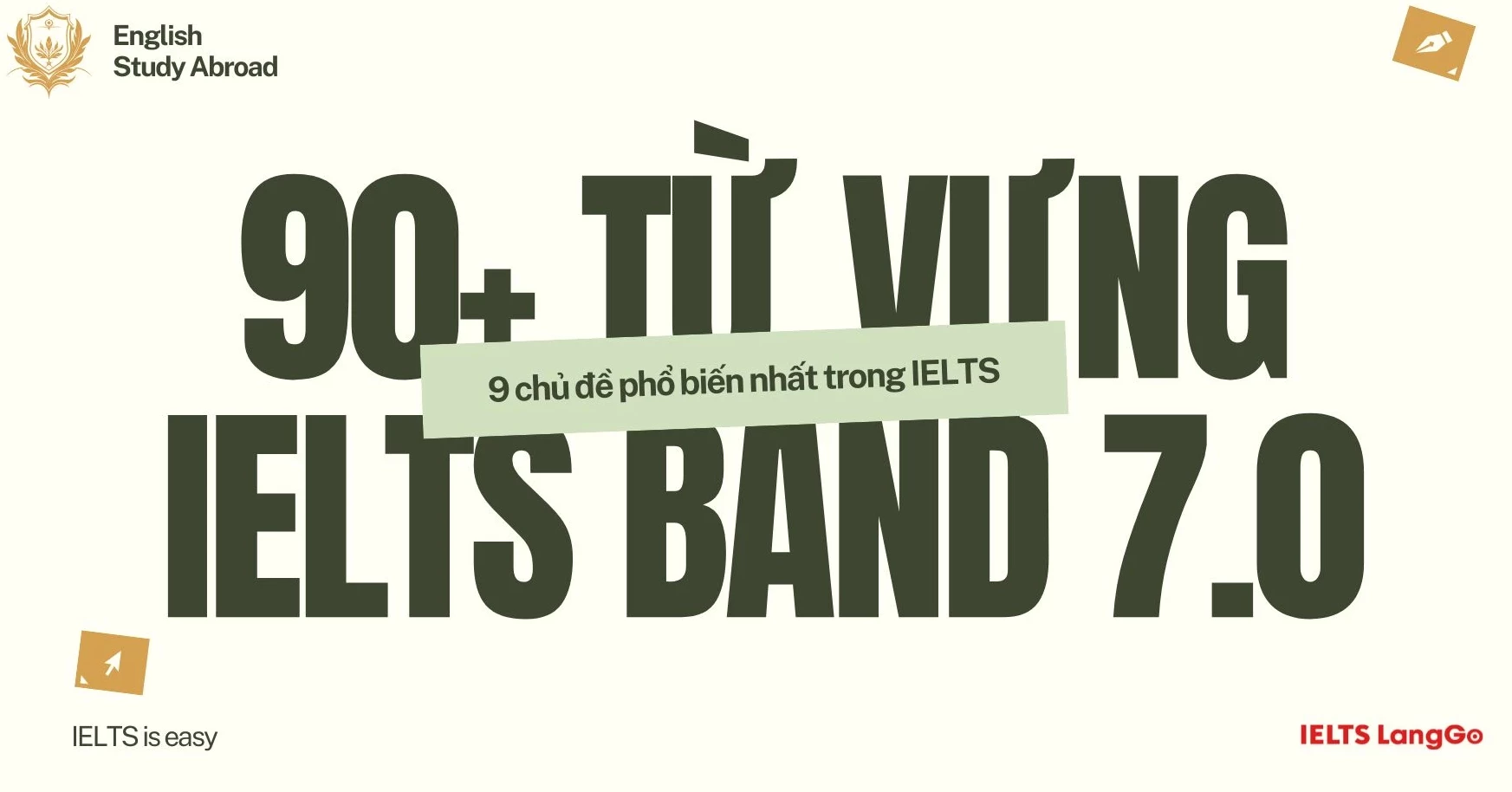
Từ vựng đóng vai trò then chốt trong việc đạt điểm cao trong kỳ thi IELTS, đặc biệt là khi mục tiêu là band 7.0. Việc sở hữu một vốn từ vựng phong phú và đa dạng không chỉ giúp thí sinh thể hiện ý tưởng một cách chính xác và tinh tế hơn, mà còn tác động trực tiếp đến hiệu suất trong tất cả bốn kỹ năng: Nghe, Nói, Đọc và Viết.
Bỏ túi ngay bộ từ vựng IELTS 7.0 theo chủ đề dưới đây để nâng cao chất lượng câu trả lời trong mỗi phần thi và thể hiện trình độ ngôn ngữ tổng thể của bạn nehs. Một vốn từ vựng phong phú là chìa khóa để mở ra cánh cửa thành công trong kỳ thi IELTS.
Để đạt được band 7.0 trong IELTS, thí sinh cần có một vốn từ vựng đáng kể, thường nằm trong khoảng 8,000 đến 12,000 từ. Tuy nhiên, không chỉ là số lượng, mà chất lượng và khả năng sử dụng từ vựng một cách linh hoạt cũng rất quan trọng.
Thí sinh cần nắm vững các từ vựng học thuật, các cụm từ thông dụng, và có khả năng sử dụng từ đồng nghĩa, trái nghĩa một cách tự nhiên. Đồng thời, họ cũng phải thể hiện được sự hiểu biết về các sắc thái ý nghĩa khác nhau của từ trong các ngữ cảnh cụ thể.
Phạm vi chủ đề mà thí sinh cần nắm vững rất rộng, bao gồm nhiều lĩnh vực khác nhau trong cuộc sống hàng ngày cũng như các vấn đề mang tính toàn cầu. Điều này đòi hỏi thí sinh phải có kiến thức tổng quát tốt và khả năng áp dụng từ vựng vào nhiều tình huống khác nhau.
Các chủ đề phổ biến trong IELTS bao gồm:
Một kho từ vựng rộng lớn giúp thí sinh dễ dàng nắm bắt những ý chính và chi tiết quan trọng, có thể bạn đã học từ vựng ở các chủ đề sau nhưng chưa có những từ vựng "đắt giá" giúp ghi điểm. Học ngay những từ vựng dưới đây để dễ dàng nâng cao band nhé!
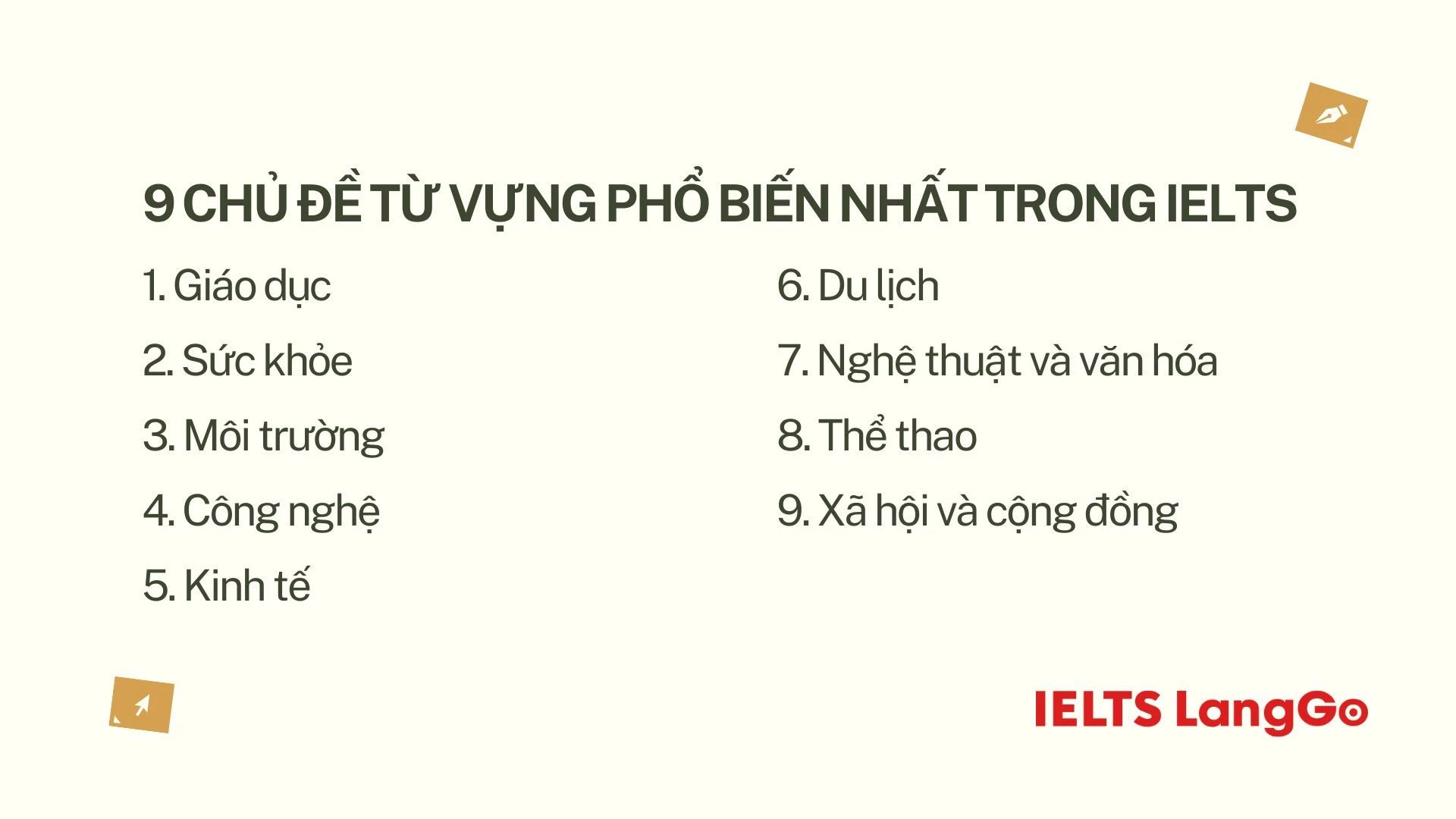
1. Curriculum (chương trình học)
Ví dụ: "The new curriculum emphasizes practical skills alongside theoretical knowledge."
2. Pedagogy (phương pháp sư phạm)
Ví dụ: "Modern pedagogy often incorporates technology to enhance student engagement."
3. Academic (học thuật)
Ví dụ: "The academic requirements for this course are quite rigorous."
4. Literacy (khả năng đọc viết)
Ví dụ: "Improving adult literacy rates is crucial for societal development."
5. Vocational (dạy nghề)
Ví dụ: "Vocational training programs provide practical skills for specific careers."
6. Syllabus (đề cương môn học)
Ví dụ: "The syllabus outlines the course objectives and weekly topics."
7. Scholarship (học bổng)
Ví dụ: "Many students rely on scholarships to fund their higher education."
8. Plagiarism (đạo văn)
Ví dụ: "Universities have strict policies against plagiarism in academic work."
9. Alumni (cựu sinh viên)
Ví dụ: "The university's alumni network provides valuable career connections."
10. Tenure (nhiệm kỳ)
Ví dụ: "Professors often work towards tenure to secure their academic positions."
1. Nutrition (dinh dưỡng)
Ví dụ: "Good nutrition is essential for maintaining optimal health."
2. Epidemic (dịch bệnh)
Ví dụ: "The rapid spread of the virus led to a global epidemic."
3. Vaccination (tiêm chủng)
Ví dụ: "Widespread vaccination has significantly reduced the incidence of many diseases."
4. Metabolism (trao đổi chất)
Ví dụ: "Regular exercise can boost your metabolism and help with weight management."
5. Holistic (toàn diện)
Ví dụ: "Many people are turning to holistic approaches to health and wellness."
6. Hygiene (vệ sinh)
Ví dụ: "Proper hygiene practices are crucial for preventing the spread of diseases."
7. Rehabilitation (phục hồi chức năng)
Ví dụ: "Physical rehabilitation helps patients recover from injuries and surgeries."
8. Pandemic (đại dịch)
Ví dụ: "The recent pandemic has transformed global health policies."
9. Immunity (miễn dịch)
Ví dụ: "A strong immune system is vital for fighting off infections."
10. Therapy (liệu pháp)
Ví dụ: "Many people find cognitive behavioral therapy helpful for managing stress."
1. Sustainability (bền vững)
Ví dụ: "Companies are increasingly focusing on sustainability in their business practices."
2. Biodiversity (đa dạng sinh học)
Ví dụ: "Protecting biodiversity is crucial for maintaining ecosystem balance."
3. Deforestation (phá rừng)
Ví dụ: "Deforestation contributes significantly to climate change and loss of wildlife habitats."
4. Renewable (tái tạo)
Ví dụ: "The country is investing heavily in renewable energy sources like solar and wind power."
5. Ecosystem (hệ sinh thái)
Ví dụ: "Human activities can have far-reaching effects on delicate ecosystems."
5. Conservation (bảo tồn)
Ví dụ: "Wildlife conservation efforts are crucial for protecting endangered species."
7. Pollution (ô nhiễm)
Ví dụ: "Air pollution in urban areas poses significant health risks."
8. Recycling (tái chế)
Ví dụ: "Effective recycling programs can significantly reduce waste in landfills."
9. Climate change (biến đổi khí hậu)
Ví dụ: "Addressing climate change requires global cooperation and commitment."
10. Biodegradable (có thể phân hủy sinh học)
Ví dụ: "Many companies are switching to biodegradable packaging materials."
1. Innovation (đổi mới)
Ví dụ: "Continuous innovation is key to staying competitive in the tech industry."
2. Artificial Intelligence (trí tuệ nhân tạo)
Ví dụ: "Artificial intelligence is revolutionizing various sectors, from healthcare to finance."
3. Cybersecurity (an ninh mạng)
Ví dụ: "With increasing digital threats, cybersecurity has become a top priority for many organizations."
4. Blockchain (chuỗi khối)
Ví dụ: "Blockchain technology has applications beyond cryptocurrency, including supply chain management."
5. Virtual Reality (thực tế ảo)
Ví dụ: "Virtual reality is creating new possibilities in education and training."
6. Algorithm (thuật toán)
Ví dụ: "Complex algorithms power many of today's advanced technologies."
7. Automation (tự động hóa)
Ví dụ: "Automation in manufacturing has increased efficiency but also raised concerns about job displacement."
8. Cryptocurrency (tiền điện tử)
Ví dụ: "The volatility of cryptocurrency markets attracts both investors and skeptics."
9. Big data (dữ liệu lớn)
Ví dụ: "Companies are leveraging big data analytics to gain business insights."
10. Internet of Things (IoT) (Internet vạn vật)
Ví dụ: "The Internet of Things is connecting everyday devices to enhance functionality."
1. Inflation (lạm phát)
Ví dụ: "High inflation rates can erode purchasing power and economic stability."
2. Globalization (toàn cầu hóa)
Ví dụ: "Globalization has led to increased economic interdependence among nations."
3. Recession (suy thoái)
Ví dụ: "The country implemented various measures to mitigate the effects of the recession."
4. Entrepreneurship (tinh thần kinh doanh)
Ví dụ: "The government has introduced policies to encourage entrepreneurship among young people."
5. Outsourcing (thuê ngoài)
Ví dụ: "Many companies are outsourcing non-core functions to reduce costs."
6. Stock market (thị trường chứng khoán)
Ví dụ: "The stock market fluctuations reflect investor confidence in the economy."
7. GDP (Gross Domestic Product) (Tổng sản phẩm quốc nội)
Ví dụ: "GDP is a key indicator of a country's economic health."
8. Tariff (thuế) Ví dụ: "Trade disputes often involve the imposition of tariffs on imported goods."
9. Fiscal policy (chính sách tài khóa)
Ví dụ: "Governments use fiscal policy to influence economic conditions."
10 Supply chain (chuỗi cung ứng)
Ví dụ: "Efficient supply chain management is crucial for business competitiveness."
1. Destination (điểm đến)
Ví dụ: "This small coastal town has become a popular tourist destination in recent years."
2. Itinerary (lịch trình)
Ví dụ: "A well-planned itinerary can help you make the most of your travel experience."
3. Ecotourism (du lịch sinh thái)
Ví dụ: "Ecotourism aims to minimize environmental impact while supporting local communities."
4. Accommodation (chỗ ở)
Ví dụ: "The city offers a wide range of accommodation options to suit different budgets."
5. Cultural immersion (hòa nhập văn hóa)
Ví dụ: "Many travelers seek cultural immersion experiences to truly understand local ways of life."
6. Passport (hộ chiếu)
Ví dụ: "A valid passport is essential for international travel."
7. Cuisine (ẩm thực)
Ví dụ: "Exploring local cuisine is an important aspect of cultural tourism."
8. Hospitality (sự hiếu khách)
Ví dụ: "The hospitality industry plays a crucial role in tourism development."
9. Souvenir (quà lưu niệm)
Ví dụ: "Tourists often buy souvenirs to remember their travels."
10. Visa (thị thực)
Ví dụ: "Some countries require tourists to obtain a visa before entry."
1. Heritage (di sản)
Ví dụ: "UNESCO works to protect and preserve cultural heritage sites around the world."
2. Avant-garde (tiên phong)
Ví dụ: "The artist's avant-garde approach challenged traditional artistic conventions."
3. Aesthetics (thẩm mỹ)
Ví dụ: "The building's unique aesthetics have made it a landmark in the city."
4. Folklore (văn hóa dân gian)
Ví dụ: "Folklore often provides insights into the beliefs and values of a society."
5. Renaissance (phục hưng)
Ví dụ: "The Renaissance period saw a revival of interest in classical learning and arts."
6. Exhibition (triển lãm)
Ví dụ: "The museum is hosting an exhibition of contemporary art."
7. Masterpiece (kiệt tác)
Ví dụ: "The Mona Lisa is considered one of Leonardo da Vinci's masterpieces."
8. Curator (người phụ trách triển lãm)
Ví dụ: "The curator carefully selected pieces for the gallery's new collection."
9. Patrimony (di sản)
Ví dụ: "Many countries work to preserve their cultural patrimony for future generations."
10. Genre (thể loại)
Ví dụ: "The film blends elements from multiple genres, including drama and sci-fi."
1. Athlete (vận động viên) Ví dụ: "Professional athletes often follow rigorous training regimens to maintain peak performance."
2. Sportsmanship (tinh thần thể thao)
Ví dụ: "Good sportsmanship is as important as winning in competitive sports."
3. Olympic (Thế vận hội)
Ví dụ: "Hosting the Olympic Games can have long-lasting impacts on a city's infrastructure."
4. Endurance (sức bền)
Ví dụ: "Marathon runners need exceptional endurance to complete the race.
5. Team spirit (tinh thần đồng đội)
Ví dụ: "Fostering team spirit is crucial for success in many sports."
6. Championship (giải vô địch)
Ví dụ: "The team is training hard for the upcoming championship."
7. Referee (trọng tài)
Ví dụ: "The referee's decisions can significantly impact the outcome of a match."
8. Doping (sử dụng chất kích thích)
Ví dụ: "Sports organizations have strict regulations against doping."
9. Tactics (chiến thuật)
Ví dụ: "The coach is known for his innovative tactics on the field.
Spectator (khán giả)
Ví dụ: "The new stadium can accommodate thousands of spectators."
1. Diversity (đa dạng)
Ví dụ: "Embracing diversity in the workplace can lead to increased creativity and innovation."
2. Urbanization (đô thị hóa)
Ví dụ: "Rapid urbanization presents both opportunities and challenges for developing countries."
3. Demographics (nhân khẩu học)
Ví dụ: "Changing demographics are influencing political and economic policies in many nations."
4. Social cohesion (gắn kết xã hội)
Ví dụ: "Community events can play a significant role in promoting social cohesion."
5. Gentrification (quá trình đô thị hóa khu dân cư)
Ví dụ: "Gentrification often leads to debates about urban development and social equity."
6. Integration (hòa nhập)
Ví dụ: "Successful integration of immigrants benefits both newcomers and host communities."
7. Discrimination (phân biệt đối xử)
Ví dụ: "Many countries have laws to prevent discrimination in the workplace.
8. Welfare (phúc lợi)
Ví dụ: "The government expanded its welfare programs to support vulnerable populations."
9. Equality (bình đẳng)
Ví dụ: "Promoting gender equality is a key goal for many organizations."
10. Multiculturalism (đa văn hóa)
Ví dụ: "Multiculturalism enriches society through diverse perspectives and traditions."
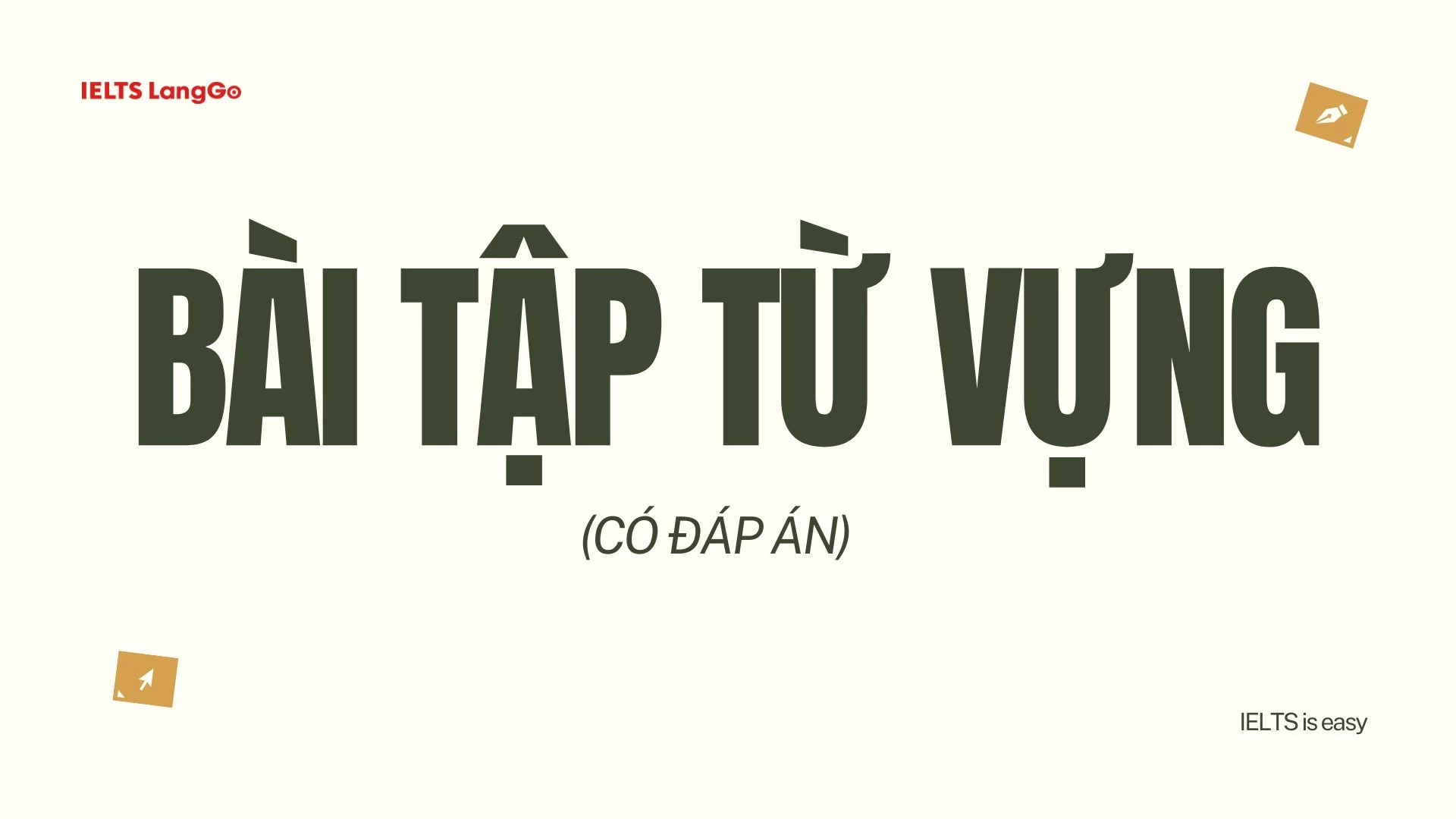
Hoàn thành các câu sau bằng cách điền từ vựng phù hợp vào chỗ trống:
Đáp án:
Sử dụng các từ vựng sau đây để viết câu hoàn chỉnh, thể hiện ý nghĩa và cách sử dụng chính xác của từ:
Hãy cố gắng tạo ra các câu phức tạp, sử dụng ngữ cảnh phù hợp để thể hiện sự hiểu biết sâu sắc về ý nghĩa và cách sử dụng của từ vựng.
Đáp án:
Trong bài tập này, bạn sẽ nhóm các từ vựng theo chủ đề hoặc tính chất tương đồng. Điều này giúp bạn tạo ra các liên kết ý nghĩa giữa các từ, làm cho việc ghi nhớ và sử dụng từ vựng trở nên dễ dàng hơn.
Hãy phân loại các từ sau đây vào các nhóm phù hợp:
Curriculum, Deforestation, Inflation, Vaccination, Outsourcing, Ecotourism, Avant-garde, Sportsmanship, Gentrification, Cybersecurity, Pedagogy, Ecosystem, Recession, Metabolism, Globalization, Itinerary, Renaissance, Endurance, Diversity, Blockchain
Các nhóm có thể bao gồm:
Sau khi phân loại, hãy giải thích lý do tại sao bạn đặt mỗi từ vào nhóm cụ thể và tìm ra mối liên hệ giữa các từ trong cùng một nhóm.
Đáp án:
Giáo dục:
Curriculum
Pedagogy
Môi trường:
Deforestation
Ecosystem
Kinh tế:
Inflation
Recession
Outsourcing
Globalization
Sức khỏe:
Vaccination
Metabolism
Du lịch:
Ecotourism
Itinerary
Nghệ thuật và Văn hóa:
Avant-garde
Renaissance
Thể thao:
Sportsmanship
Endurance
Xã hội và Cộng đồng:
Gentrification
Diversity
Công nghệ:
Cybersecurity
Blockchain
Để đạt được mục tiêu band 7.0 trong IELTS, việc học và thực hành từ vựng một cách liên tục là vô cùng quan trọng. IELTS LangGo chân thành khuyên bạn hãy biến việc học từ vựng thành một thói quen hàng ngày. Bạn có thể đặt mục tiêu học 10-15 từ mới mỗi ngày và ôn lại các từ đã học trước đó.
Sử dụng các ứng dụng học từ vựng để nhắc nhở và kiểm tra kiến thức thường xuyên. Quan trọng hơn, hãy cố gắng sử dụng những từ mới học trong giao tiếp hàng ngày, viết blog hoặc tham gia các diễn đàn tiếng Anh.
Nhớ rằng, sự kiên trì và nhất quán trong việc học tập sẽ mang lại kết quả tốt nhất.
Việc liên tục mở rộng vốn từ vựng còn giúp bạn phát triển tư duy phản biện và khả năng tiếp cận các ý tưởng phức tạp - những kỹ năng vô cùng cần thiết không chỉ trong kỳ thi IELTS mà còn trong cuộc sống học tập và công việc sau này.
Vì vậy, hãy đầu tư thời gian và công sức vào việc học từ vựng một cách có hệ thống và kiên trì. Kết quả đạt được chắc chắn sẽ xứng đáng với nỗ lực của bạn.
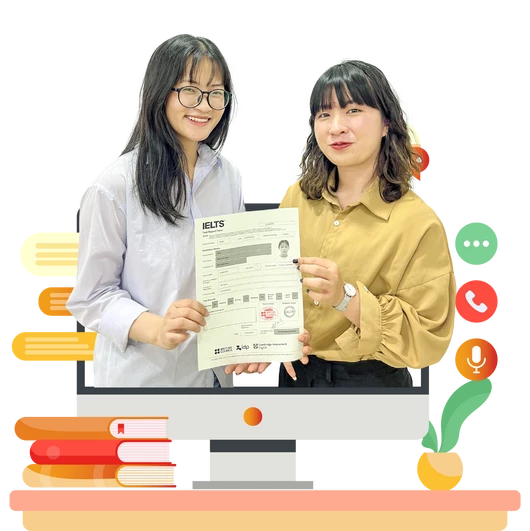

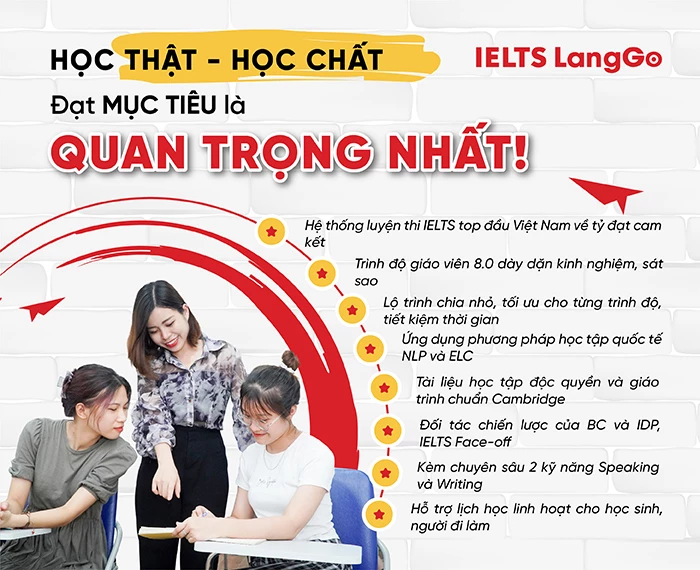
ĐẶT LỊCH TƯ VẤN MIỄN PHÍ LỘ TRÌNH Săn ƯU ĐÃI lên tới 12.000.000đ